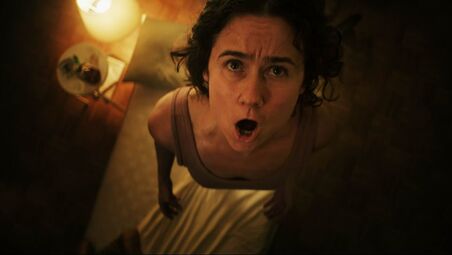 If a tree falls in the woods and no one is around to hear it, does it make a sound?... ...If only one person hears the crashing, and everyone else around them stands by believing in silence, which experience is true? Only one? Both? Neither? Playing in the Midnight Selection of 2021’s virtual Sundance Film Festival, Knocking, written by Emma Broström and directed by Frida Kempff, confronts us with a similar conundrum of truth in its tale of a woman fighting to be believed when she begins to hear something in the walls of her apartment. Adapted from a short story by Johan Theorin, Knocking follows Molly (Cecillia Milocco), who has just been released after a year in recovery in a psych ward following a tragic accident. Attempting a fresh start, she slowly settles into a new apartment and continues checking in with her therapist. One night, while she’s floating in her grief, she hears a knocking in her ceiling. It begins as virtually imperceptible, little more than what you would hear from an upstairs neighbor in any apartment complex, and soon spirals into what sounds to her like a frenzy of morse code begging for help. Convinced someone in the building is in danger, Molly confronts her neighbors, her building super, and even the police about the sound. Trouble is, no one else seems able to hear it. No matter how hard she pushes or how loud she demands, no one else tells her they hear the knocking sound. What devolves from there is a study in the effects of grief and the power of social pressure on our beliefs about ourselves. Clocking in at just 78 minutes, the film wastes no time bringing the tension to the forefront, thanks in no small part to the one-two punch powerhouse abilities of the sound design and cinematography. Knocking sets itself up as a visual stunner right from the opening shot of Molly and her partner Judith (Charlotta Åkerblom) laid out on the beach on vivid red and green towels respectively. With full trust in the audience to retain this color association, cinematographer Hannes Krantz spends the rest of the film weaving the feeling of the story through with reds and greens; almost every shot is bathed in either one or both. Molly is most often outfitted in red, her bedroom is red, the pen she uses to frantically record the morse code in the walls is red…the list goes on. Interestingly, however, almost all of her apartment complex is lit in a greenish hue. The sheets of her bed, the plants she buys to make her new place feel homey, the hallway lights flickering faintly as she demands entrance into her neighbors’ apartments, it’s all tied to the color we know to be her lover’s. She may be alone in her fight for sanity and belief, but how alone is she, really? Everywhere the camera turns, the two of them are melded together in our minds as we watch the events unfold. You can’t very well have a film about a sound in your walls without having an impressive sound design team to back you up, and fortunately for us Knocking has no short supply of sound talent. The delicate dance between the score by Martin Dirkov and sound designers Thomas Jæger and Rasmus Mølberg Meyer is integral to how effectively Molly’s struggle for the truth is articulated. Even if no one else around her can hear the rhythmic yet increasingly frantic pounding, we have to. It’s a testament to the abilities of everyone involved that we still, by film’s end, may not be sure where we stand on the truth. In her Meet the Artist segment for the film, Frida Kempff explains Knocking through a few different filters. Though every neighbor Molly has is male, it isn’t just men that don’t consider her pleas for help seriously. The woman she reaches out to as a last resort in what may as well be a DMV calls the cops on her as she frantically explains her predicament. Kempff says Knocking gives a view into the conditions of the #MeToo movement, where women demanding belief about horrific situations came more to the forefront. Most fascinating to me, beyond and linked with the gender dynamics of belief, was her idea that Knocking asks us to confront the complex idea of who owns the truth. Whose truth is the truest—the right one? And who are we to decide there is only one, especially when it comes to articulating trauma? By Katelyn Nelson
0 Comments
Leave a Reply. |
Archives
March 2023
|


 RSS Feed
RSS Feed